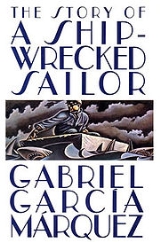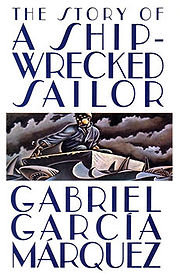
The Story of a Shipwrecked Sailor
Encyclopedia
- For the Egyptian tale, see Tale of the shipwrecked sailorTale of the shipwrecked sailorThe Tale of the Shipwrecked Sailor is a Middle Kingdom story of an Ancient Egyptian voyage to "the King's mines" .-Historical information:...

Non-fiction
Non-fiction is the form of any narrative, account, or other communicative work whose assertions and descriptions are understood to be fact...
by Colombia
Colombia
Colombia, officially the Republic of Colombia , is a unitary constitutional republic comprising thirty-two departments. The country is located in northwestern South America, bordered to the east by Venezuela and Brazil; to the south by Ecuador and Peru; to the north by the Caribbean Sea; to the...
n writer Gabriel García Márquez
Gabriel García Márquez
Gabriel José de la Concordia García Márquez is a Colombian novelist, short-story writer, screenwriter and journalist, known affectionately as Gabo throughout Latin America. He is considered one of the most significant authors of the 20th century. He was awarded the Nobel Prize in Literature in...
. The full title is The Story of a Shipwrecked Sailor: Who Drifted on a Liferaft for Ten Days Without Food or Water, Was Proclaimed a National Hero, Kissed by Beauty Queens, Made Rich Through Publicity, and Then Spurned by the Government and Forgotten for All Time.
It was originally published as a fourteen consecutive day series of installments in El Espectador
El Espectador
El Espectador is a newspaper with national circulation within Colombia, founded by Fidel Cano Gutiérrez on 22 March 1887 in Medellín and published since 1915 in Bogotá...
newspaper in 1955; it was later published as a book in 1970, and then translated into English
English language
English is a West Germanic language that arose in the Anglo-Saxon kingdoms of England and spread into what was to become south-east Scotland under the influence of the Anglian medieval kingdom of Northumbria...
by Randolph Hogan in 1986. The story is written in the first-person from the perspective of the sailor, 20 year-old Luis Alejandro Velasco, and was in fact signed by Velasco as author when it was first published in 1955. Not until 1970 when it was published as a book was García Márquez's name first publicly associated with the story.
Nobel laureate Gabriel García Márquez began his literary career as a newspaper writer. In 1955, he wrote a series of newspaper stories about a shipwrecked sailor who nearly died on account of negligence by the Colombian Navy
Military of Colombia
The Military Forces of Colombia are the armed forces of the Republic of Colombia.-Services:The Military of Colombia consists of:* National Army of Colombia * Colombian National Armada - Marines, Navy and Coast Guard attached* Colombian Air Force...
; several of his colleagues drowned shortly before arriving at the port of Cartagena de Indias due to the existence of overweight contraband aboard the vessel. This resulted in public controversy, as it discredited the official account of the events, which had blamed a non-existent storm for the shipwreck and glorified the surviving sailor. As García Márquez subsequently became a sort of persona non grata
Persona non grata
Persona non grata , literally meaning "an unwelcome person", is a legal term used in diplomacy that indicates a proscription against a person entering the country...
for the government of General Gustavo Rojas Pinilla
Gustavo Rojas Pinilla
Gustavo Rojas Pinilla was a Colombian politician, military officer, General of the Army and President of Colombia between 1953 and 1957.- Biographic data :...
, he then worked for several years as a foreign correspondent
Foreign correspondent
Foreign Correspondent may refer to:*Foreign correspondent *Foreign Correspondent , an Alfred Hitchcock film*Foreign Correspondent , an Australian current affairs programme...
.
The book's theme is the possible, but not necessary, moral reversion to a primitive, instinctual existence in the face of a sea catastrophe and consequent shipwreck
Shipwreck
A shipwreck is what remains of a ship that has wrecked, either sunk or beached. Whatever the cause, a sunken ship or a wrecked ship is a physical example of the event: this explains why the two concepts are often overlapping in English....
and solitude. This theme had been explored previously in fiction by Daniel Defoe
Daniel Defoe
Daniel Defoe , born Daniel Foe, was an English trader, writer, journalist, and pamphleteer, who gained fame for his novel Robinson Crusoe. Defoe is notable for being one of the earliest proponents of the novel, as he helped to popularise the form in Britain and along with others such as Richardson,...
(Robinson Crusoe
Robinson Crusoe
Robinson Crusoe is a novel by Daniel Defoe that was first published in 1719. Epistolary, confessional, and didactic in form, the book is a fictional autobiography of the title character—a castaway who spends 28 years on a remote tropical island near Trinidad, encountering cannibals, captives, and...
and the robinsonade
Robinsonade
Robinsonade is a literary genre that takes its name from the 1719 novel Robinson Crusoe by Daniel Defoe. The success of this novel spawned enough imitations that its name was used to define a genre, which is sometimes described simply as a "desert island story"...
genre) and Voltaire
Voltaire
François-Marie Arouet , better known by the pen name Voltaire , was a French Enlightenment writer, historian and philosopher famous for his wit and for his advocacy of civil liberties, including freedom of religion, free trade and separation of church and state...
(Candide
Candide
Candide, ou l'Optimisme is a French satire first published in 1759 by Voltaire, a philosopher of the Age of Enlightenment. The novella has been widely translated, with English versions titled Candide: or, All for the Best ; Candide: or, The Optimist ; and Candide: or, Optimism...
), and more recently by William Golding
William Golding
Sir William Gerald Golding was a British novelist, poet, playwright and Nobel Prize for Literature laureate, best known for his novel Lord of the Flies...
(Lord of the Flies
Lord of the Flies
Lord of the Flies is a novel by Nobel Prize-winning author William Golding about a group of British boys stuck on a deserted island who try to govern themselves, with disastrous results...
and Pincher Martin
Pincher Martin
Pincher Martin: The Two Deaths of Christopher Martin , is a survivalist novel by British writer William Golding, first published in 1956...
), Umberto Eco
Umberto Eco
Umberto Eco Knight Grand Cross is an Italian semiotician, essayist, philosopher, literary critic, and novelist, best known for his novel The Name of the Rose , an intellectual mystery combining semiotics in fiction, biblical analysis, medieval studies and literary theory...
(The Island of the Day Before
The Island of the Day Before
The Island of the Day Before is a 1994 novel by Umberto Eco.It is the story of a 17th century Italian nobleman who is the only survivor of a shipwreck during a fierce storm. He finds himself washed up on an abandoned ship in a harbour through which, he convinces himself, runs the International...
), J.M. Coetzee (Foe
Foe (novel)
Foe is a 1986 novel by South African author J. M. Coetzee. Woven around the existing plot of Robinson Crusoe, Foe is written from the perspective of Susan Barton, a castaway who landed on the same island inhabited by "Cruso" and Friday as their adventures were already underway...
), José Saramago
José Saramago
José de Sousa Saramago, GColSE was a Nobel-laureate Portuguese novelist, poet, playwright and journalist. His works, some of which can be seen as allegories, commonly present subversive perspectives on historic events, emphasizing the human factor. Harold Bloom has described Saramago as "a...
(The Stone Raft
The Stone Raft
The Stone Raft is a novel by Nobel Prize in Literature-winning Portuguese writer José Saramago. It first appeared in Portuguese in 1986, and was translated into English in 1994...
and The Tale of the Unknown Island
The Tale of the Unknown Island
"The Tale of the Unknown Island" is a short story by Portuguese author José Saramago. It was published in Portuguese in 1997, and English in 1999.-Plot:...
). A later non-fiction treatment of a similar theme can be found in The Last Strange Voyage of Donald Crowhurst
Donald Crowhurst
Donald Crowhurst was a British businessman and amateur sailor who died while competing in the Sunday Times Golden Globe Race, a single-handed, round-the-world yacht race. Crowhurst had entered the race in hopes of winning a cash prize from The Sunday Times to aid his failing business...
by Ron Hall and Nicolas Tomalin.
The story
Seaman Luis Alejandro Velasco of the destroyer Caldas is eager to return to Colombia after a long stay in the United StatesUnited States
The United States of America is a federal constitutional republic comprising fifty states and a federal district...
. When the ship sets sail, however, it is overloaded — in part with contraband. When the vessel is caught in heavy waves in the Caribbean, eight of the crew are washed overboard, together with much of the cargo. After four days the search ends, with the missing declared dead. However, Velasco found a raft and remained on the open sea without food and without hope. After drifting with sea currents for ten days, he arrives with his raft on a coast that he later discovers to be Colombia. He is received first with affection and later with military honors and much money from publicity agencies.
Subject's later life
Luis Alejandro Velasco Rodríguez left the Navy and began to work in the private sector, starting with a job in a bus company. He eventually settled into work as a commercial agent in an insurance company in Bogotá. When Gabriel García Márquez published the story fifteen years later - in 1970 - in the book Relato de un Náufrago, he generously ceded the author's rights and royalties to Velasco. In 1983, Velasco sued for translation rights to the book and lost. In the last week of his life, he apologized to García Márquez for the lawsuit. He died in Bogotá on August 2, 2000, aged 66.Editions in print
- ISBN 0-14-015755-7, UK paperback (Penguin)
- ISBN 0-679-72205-X, US paperback (Vintage)

